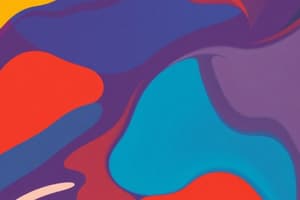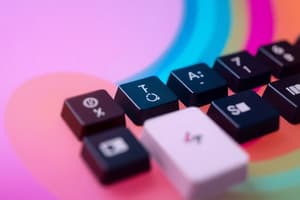Podcast
Questions and Answers
What is the shortcut to toggle the running object snaps?
What is the shortcut to toggle the running object snaps?
- Ctrl+e
- Ctrl+g
- Ctrl+h
- Ctrl+f (correct)
Which command is used to create a circle?
Which command is used to create a circle?
- JOIN
- ARC
- CIRCLE (correct)
- REDRAW
Which command allows you to clean the screen?
Which command allows you to clean the screen?
- Ctrl+4
- Ctrl+1
- Ctrl+2
- Ctrl+0 (correct)
What does the ZOOM command do?
What does the ZOOM command do?
Which shortcut is used to switch to the previous drawing?
Which shortcut is used to switch to the previous drawing?
Which option uses the hatch pattern for filling areas?
Which option uses the hatch pattern for filling areas?
What does the shortcut Ctrl+n accomplish?
What does the shortcut Ctrl+n accomplish?
What is the functionality of the key combination Ctrl+Shift+c?
What is the functionality of the key combination Ctrl+Shift+c?
What is the purpose of the FILLET command?
What is the purpose of the FILLET command?
Which shortcut is used to toggle dynamic input mode?
Which shortcut is used to toggle dynamic input mode?
Which command would you use to refresh the display?
Which command would you use to refresh the display?
Which command is related to the object snap tracking feature?
Which command is related to the object snap tracking feature?
What does the JOIN command do?
What does the JOIN command do?
Which command helps in creating an arc?
Which command helps in creating an arc?
What does the shortcut Ctrl+z do?
What does the shortcut Ctrl+z do?
The ALT key is typically used for which purpose?
The ALT key is typically used for which purpose?
What command is used to create a diameter dimension for a circle or arc?
What command is used to create a diameter dimension for a circle or arc?
Which command allows you to remove associativity from selected dimensions?
Which command allows you to remove associativity from selected dimensions?
What does the DIMOVERRIDE command control?
What does the DIMOVERRIDE command control?
Which command applies dimensional constraints to selected objects or points on objects?
Which command applies dimensional constraints to selected objects or points on objects?
What command is used for creating and managing saved sets of objects?
What command is used for creating and managing saved sets of objects?
Which command is utilized to edit dimension text and extension lines?
Which command is utilized to edit dimension text and extension lines?
What effect does the DRAWORDER command have on objects within a drawing?
What effect does the DRAWORDER command have on objects within a drawing?
Which command creates a filled circle or a wide ring?
Which command creates a filled circle or a wide ring?
What function does the 'Esc' key perform in this context?
What function does the 'Esc' key perform in this context?
What command would you use to manage layers in a drawing file?
What command would you use to manage layers in a drawing file?
Which of the following is a one key shortcut related to dynamic functions?
Which of the following is a one key shortcut related to dynamic functions?
Which toggle function is related to the movement of objects?
Which toggle function is related to the movement of objects?
Which command is used to create multiple parallel lines?
Which command is used to create multiple parallel lines?
In what situation would you use the 'Toggle text screen' shortcut?
In what situation would you use the 'Toggle text screen' shortcut?
Which command allows you to rotate the view in 3D space?
Which command allows you to rotate the view in 3D space?
What does the LENGTHEN command do?
What does the LENGTHEN command do?
Which shortcut would you use to ensure objects are aligned to the grid?
Which shortcut would you use to ensure objects are aligned to the grid?
Which command is responsible for creating a leader annotation?
Which command is responsible for creating a leader annotation?
How does 'Toggle polar mode' affect object movement?
How does 'Toggle polar mode' affect object movement?
What does the 'Toggle 3DOsnap' function perform?
What does the 'Toggle 3DOsnap' function perform?
Which command would you use to set running object snap modes?
Which command would you use to set running object snap modes?
What is the purpose of the LAYERSTATE command?
What is the purpose of the LAYERSTATE command?
Which one key shortcut allows you to adjust the visibility of dynamic objects?
Which one key shortcut allows you to adjust the visibility of dynamic objects?
Which command creates a mirrored copy of selected objects?
Which command creates a mirrored copy of selected objects?
Which of the following shortcuts is NOT used to toggle a mode for object manipulation?
Which of the following shortcuts is NOT used to toggle a mode for object manipulation?
What is the primary function of the 'F1' key in this context?
What is the primary function of the 'F1' key in this context?
Flashcards are hidden until you start studying
Study Notes
One Key Shortcuts
- Use
Escto cancel the current command. - Press
F1to display help information. F2allows you to toggle the text screen.F3enables you to toggle object snap mode.F4toggles 3DOsnap.F5toggles the Isoplane.F6toggles the Dynamic UCS.F7toggles grid mode.F8toggles ortho mode.F9toggles snap mode.F10toggles polar mode.F11toggles object snap tracking.F12toggles dynamic input mode.
Toggles and Screen Management
-
Use
Ctrl+dto toggle coordinate display. -
Use
Ctrl+gto toggle the grid. -
Use
Ctrl+eto cycle through isometric planes. -
Use
Ctrl+fto toggle running object snaps. -
Use
Ctrl+hto toggle pick style. -
Use
Ctrl+Shift+hto toggle the visibility of palettes. -
Use
Ctrl+ito toggle coordinates. -
Use
Ctrl+Shift+ito toggle infer constraints. -
Use
Ctrl+0to clean the screen. -
Use
Ctrl+1to open the Property Palette. -
Use
Ctrl+2to access the Design Center Palette. -
Use
Ctrl+3to open the Tools Palette. -
Use
Ctrl+4to access the Sheet Set Palette. -
Use
Ctrl+6to open the DBConnect Manager. -
Use
Ctrl+7to open the Markup Set Manager Palette. -
Use
Ctrl+8to access Quick Calc. -
Use
Ctrl+9to access the command prompt. -
Use
Ctrl+qto exit the software. -
Use
Ctrl+nto create a new drawing. -
Use
Ctrl+sto save the current drawing. -
Use
Ctrl+oto open a drawing. -
Use
Ctrl+pto open the plot dialog box. -
Use
Ctrl+Tabto switch to the next drawing. -
Use
Ctrl+Shift+Tabto switch to the previous drawing. -
Use
Ctrl+Page Upto switch to the previous tab. -
Use
Ctrl+Page Downto switch to the next tab.
Manage Drawings
- Use
Ctrl+ato select all objects in the current drawing. - Use
Ctrl+cto copy an object. - Use
Ctrl+xto cut an object. - Use
Ctrl+vto paste an object. - Use
Ctrl+Shift+cto copy to clipboard with a base point. - Use
Ctrl+Shift+vto paste data as a block. - Use
Ctrl+zto undo the last action. - Use
Ctrl+yto redo the last action. - Use
Ctrl+[orCtrl+\to cancel the current command.
Hot Keys A-Z
Aallows you to draw an arc.DCONlets you apply dimensional constraints to objects or points.DCOallows you to create a dimension that continues from a previously created dimension.DORallows you to create ordinate dimensions.DOVallows you to override system variables used in dimensions.DDAlets you remove associativity for dimensions.DRallows you to change the draw order of objects.DDIlets you draw a diameter dimension.DRAlets you create a radius dimension.DEDlets you edit dimension text and extension lines.DRElets you associate or re-associate dimensions to objects.Elets you erase objects from a drawing.EDlets you edit text and dimension text.ELlets you draw ellipses.Glets you create and manage groups of objects.GCONlets you apply relationships between objects.Ilets you insert a block or drawing into the current drawing.IADlets you adjust the display of images.IATlets you insert an image into the drawing.Llets you draw lines.LAlets you manage layers.LASlets you manage layer states.LESSlets you decrease the level of smoothness for mesh objects.LIlets you display data for selected objects.LOlets you manage layouts.LTlets you load, set, and modify linetypes.LTSlets you change the scale factor of linetypes.MEAallows you to measure objects or points.MIlets you mirror objects.MLlets you create multi-leader objects.MLAlets you align and space multi-leader objects.MLElets you edit multi-leader objects.MLSlets you create and modify multi-leader styles.MLDlets you create a multi-leader object.MLClets you organize selected multi-leader objects that contain blocks into rows or columns.LENlets you change the length of objects.LElets you draw leaders.NORTHlets you add geographic location information to a drawing.NSHOTlets you create a named view with animation.NVIEWlets you create a named view without animation.Olets you create circles or lines that are parallel to existing geometry.OPlets you customize the software settings.ORBITlets you rotate the view in 3D.OSlets you set object snap modes.QSAVElets you save the current drawing.RClets you draw an arc.REDRAWlets you refresh the display.JOINlets you combine objects.ZOOMlets you zoom in and out of the drawing.ATCHlets you fill an area with a hatch, solid fill, or gradient.QSAVElets you save the current drawing.CIRCLElets you draw circles.VIEWlets you manage the viewport.BLOCKlets you create custom blocks.MOVElets you move objects.
Studying That Suits You
Use AI to generate personalized quizzes and flashcards to suit your learning preferences.




